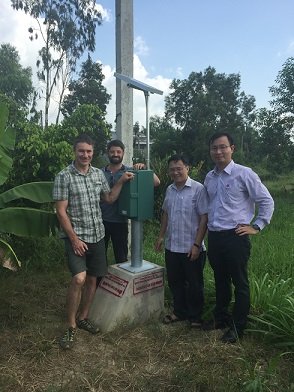|
Cycle 8 (2019 Deadline)
Sustainable groundwater management under socioeconomic and climate change in Mekong Delta, Vietnam
PI: Chau Nguyen Xuan Quang (cnxquang@wacc.edu.vn), Vietnam National University - Ho Chi Minh City, with co-PI Sangam Shrestha (sangam@ait.asia), Asian Institute of Technology
U.S. Partner: John Sabo, Arizona State University
Project dates: December 2019 - November 2023
Project Overview
 | | The PEER team in the field prior to COVID (photo courtesy of Dr. Quang). |
The Vietnamese Mekong Delta (VMD) in southwest Vietnam is home to 18 million residents. The VMD produces half of Vietnam’s rice and contributes a substantial part of the country’s gross domestic product. In the delta region, groundwater is an essential and valuable resource, especially in coastal and remote areas. However, this resource is under threat due to over-extraction, drought, climate change, sea level rise, and other factors. Groundwater extraction has increased considerably to meet the demands of agriculture, aquaculture production, and domestic and industrial water supplies.
This PEER project sought to provide robust, science-based evidence on the combined impacts of socioeconomic factors and climate change on groundwater and propose feasible adaptation options and implementation pathways for groundwater governance for policymakers. They also wanted to create a knowledge platform for involved stakeholders to eventually facilitate the decision-making process. The research team generated high-resolution future climate data using regional climate models to evaluate the impacts of climate change on groundwater in the near (2030s), mid (2050s), and distant (2080s) future. Socioeconomic were used to analyze and estimate the existing and future groundwater demand in the VMD. The technical knowledge and regional experience of the U.S. partner provided insights to the Vietnamese researchers in analyzing the modeling results.
Final Summary of Project Activities
The team gathered and analyzed historical meteorological data from 1986 to 2019 in the VMD to develop an updated climate change scenario for the VMD region. The updated and high-resolution climate change scenarios provided more reliable rainfall and temperature inputs for hydrological and water assessment in the VMD. The researchers also established hydrological and groundwater flow models. Using survey data on current groundwater demand and future development scenarios, they developed future groundwater demand scenarios for Tra Vinh and Ben Tre provinces.
Their study revealed significant socioeconomic influences on groundwater in Tra Vinh and Ben Tre provinces, particularly the adverse effects of groundwater exploration for irrigation and shrimp farming during dry seasons. The study also identified clear indications of recharge zones within the province, and the team found that groundwater resources hold significant potential to support socioeconomic development and climate change adaptation in the VMD. The application of innovative solutions for groundwater recharge is essential, and strategies for using water during critical times should be incorporated into climate change adaptation plans.
The team also hosted capacity-building workshops, including on topics such as sustainable groundwater usage, policy formulation, and the impact of climate change on water resources. They also used a workshop to present the research results to the scientific community and stakeholders. During the project they met with several key national and regional agencies managing water resources. They are developing an article for publication.
Back to PEER Cycle 8 Grant Recipients
|
|
|
|




